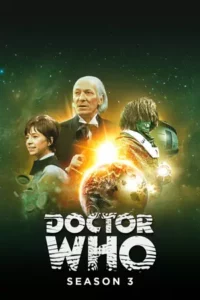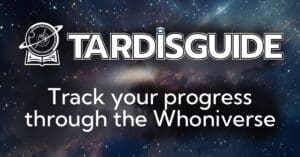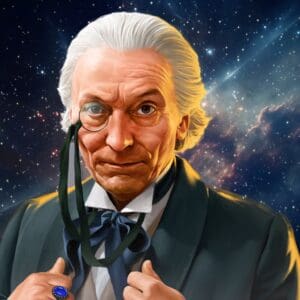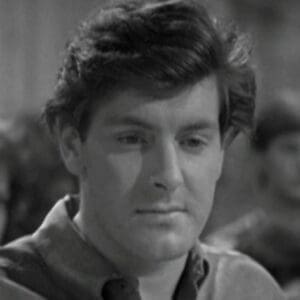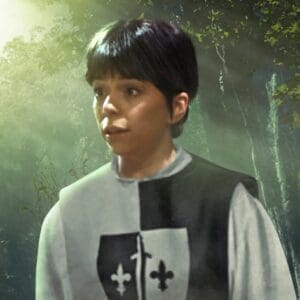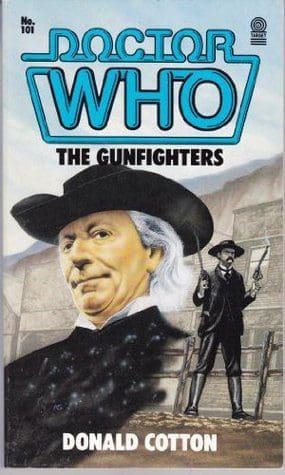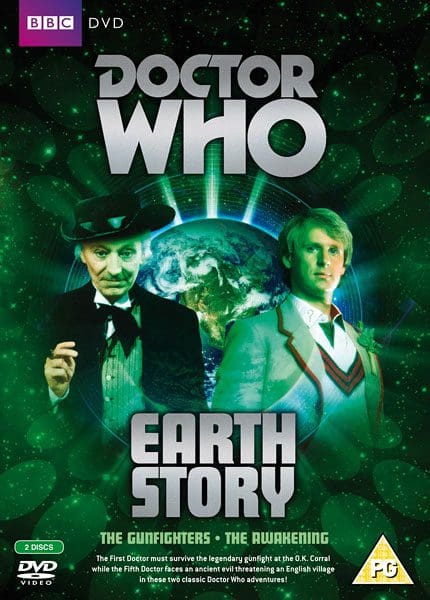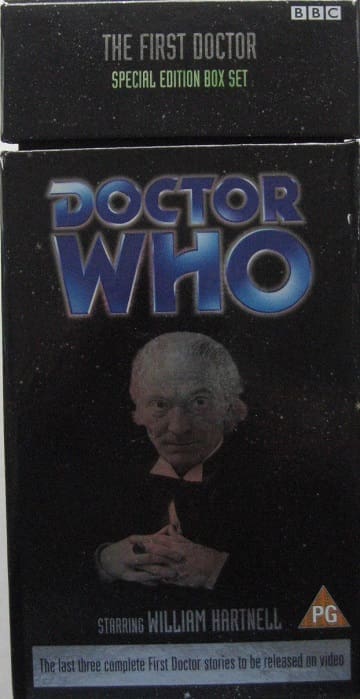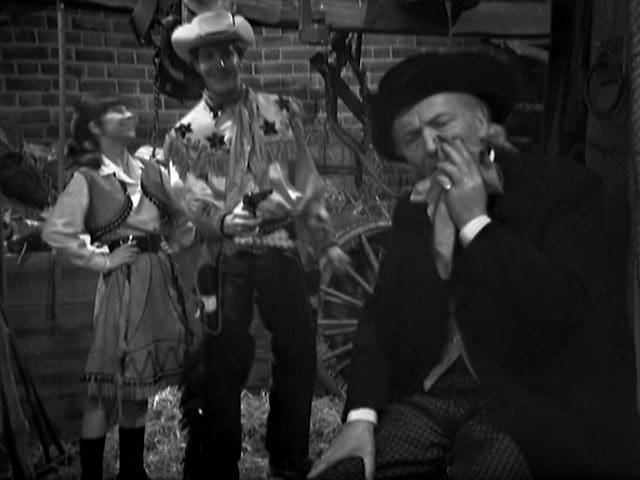
Classic Who S3 • Serial 8 · (4 episodes)
The Gunfighters
Other variations of this story: The Gunfighters (BBC Audio Soundtrack)
Reviews and links from the Community
This review contains spoilers
Review of The Gunfighters by Dogtor
“Doc Holliday’s great friend of mine.”
La joie que retrouve enfin la série est tellement communicative qu’on pourrait presque oublier ce qui rend The Gunfighters si bon en premier lieu.
Mais déjà Cotton est une voix monstrueusement négligée, et chaque ligne qu’il écrit est hilarante.
Des personnages aussi mal conçus que Steven ou Dodo reprennent même carrément vie !
Mais étonnamment la mort hante aussi tout son script.
Review of The Gunfighters by turnoftheearth
I’ve put on my Stetson, I’ve made up a song,
People think this one’s a stinker but they’re all damn wrong!
So open your earholes, I’ll soon change your tune,
Let’s talk about the masterpiece…
At the Last Chance Saloon.
While watching THE GUNFIGHTERS (1966, Donald Cotton) I think it’s natural for a lot of questions to spring into one’s mind. Questions like “How long did it take them to come up with this many verses?” and “What exactly was the sweet that The Doctor was eating?”. Questions like “How on Earth did they afford to fly out all these genuine Americans to play cowboys on the meagre budgets of 1966?”, and “Did William Hartnell stand in any horse poo, and if so, how did he react?” So many important questions, most of them with answers you could at least guess at (in order, 1. Either far too long or far too fast, 2. Fisherman’s Friend, 3. OK I had a hard time writing that one with a straight face, and 4. Almost certainly, and what he said can’t be reprinted on a family friendly blog) but going into this serial having read a fair few reviews and with an understanding of larger fandom opinions, I had one very big question, nagging at me like a broken tooth that needed pulling, one that did not seem to have an answer.
“How did this get its reputation as one of the worst Hartnell stories, nay, one of the worst Doctor Who stories of all time?”
So, like Gandalf riding his horse to Minas Tirith while the Hobbits dodge murder in the woodlands, I went digging through my references and with embarrassment realized that that “unanswerable” question actually seems to have been answered; we think it’s bad because most of the 80s reference works told us so. Even more embarrassing was discovering that my enjoyment of this story was no longer that transgressive; on the contrary, El Sandifer tells me that because I like this story I’m engaging in something called “Reconstructionist criticism”, which sounds lovely and fantastic and certainly makes me feel warm and special, but also means that coming into this review hoping to break ground by calling it a masterpiece just isn’t going to turn heads.
Yes, I did use the word “masterpiece.” Maybe that alone will still bend some necks, because on paper, it isn’t. “Masterpiece” is a word I use a lot more subjectively than many. There are things in this world that have objectively been considered failures that I would look at and call a masterpiece. I think that’s part and parcel of being a Doctor Who fan, or at least one obsessive enough to write reviews; we all have our own personal masterpieces, each with its own defining features, and frankly, objective quality rarely factors into those equations. I call this a masterpiece because I think it not only sets out what it wants to do with style and aplomb, but also because it lays down groundwork for one of the things most celebrated about Doctor Who, and one that’s most special to me - the fact that it can do anything. Nowhere is this clearer than in the much maligned song.
Sandifer talks about the song, saying:
“…it is a line in the sand that declares that the world of the Western is different from everything else. [It is] clear that the TARDIS is visiting an existing landscape.”
I agree with this wholeheartedly and would even take it a step further; the distinction between the “accurate” historicals and the “fun” historicals is already well defined at this point so I won’t harp on it too much. The short version is that some historicals are concerned with evoking a period accurately and some of them are concerned with making sure all the correct historical genre tropes get hit.
The Gunfighters falls squarely into the latter camp; we are presented with this simulacra of the Old West, so clearly not real that Steven and Dodo’s costumes are almost picture-perfect recreations of Woody and Jessie from Toy Story, but no one really pays attention to the anachronisms. Their actions and backstory are narrated by a song at every turn. They haven’t landed in Tombstone; they’ve landed inside The Ballad of the Last Chance Saloon, something I think has been overlooked by other readings. This story isn’t best read as a funny historical, this is a story best read as a precursor to The Mind Robber, but also to so many genre and format-bending stories in the EU and, yes, begrudgingly so, I will admit that it’s this story that extends out into The Church on Ruby Road and The Devil’s Chord. Because to talk about the legacy of The Gunfighters, you have to talk about music in Doctor Who.
Neither of those two latterly mentioned contemporary episodes are my favorites. In fact, I don’t much like CoRR and The Devil’s Chord is mostly saved for me by the performances, and not the music. But those songs aren’t any more artfully written than The Ballad of the Last Chance Saloon, which was apparently being constantly re-written and updated with more and more specific lyrics about the plot. So why do I have such a problem with The Goblin Song and “There’s Always a Twist at The End” when, apart from a couple of gripes about words that could scan better, I find the Ballad not only charming, but one of the vitally important muscles flexing in this episode’s circulatory system?
I think the answer stems from that first, important question I asked, the one I thought I had no answer to. Why did people react poorly to this when it originally aired? The answer may be that they didn’t, who knows? It turns out that question only mattered for as long as Jeremy Bentham told us it did. But there’s an inverse to that question, perhaps one that’s more vital. Why have people suddenly decided that it’s good again? In what way were we able to reevaluate and unlearn our preconceptions? I think the Ballad is the key factor in both of these questions.
I don’t have a hard time believing that when Lynda Baron croons her way into the opening seconds of this episode, people were confused. I can imagine a world where, as the episode progresses, despite the solid performances from the central cast, the reoccurrence of the song would begin to grate on the parents watching. Hell, even some of the smaller children, far more used to space adventure, might well have given a curious turn and asked, “Mummy, will she be singing through all of Doctor Who?”
The viewing figures bear this out. 6.5m the first week, followed by a slight up-tick to 6.6 in the one to follow. Attributed perhaps, to people tuning in to see if it was going to be another week with “that bloody song”. And then a steep fall-off for the remaining two weeks of the serial. Not, as the rumors go, the lowest ever recorded, especially if you’re like me and think AI figures are mostly garbage anyway, but still enough of a reaction to draw evidence from. Whether this was wildly hated at the time, who can say. But something made people stop watching, and given that the acting, production, direction and design are all, to my eyes, at least as good as anything else the show was doing at the time (they had real horses! Imagine the paperwork.), I can come to maybe three conclusions:
- The song, as discussed.
- The accents, which are admittedly all over the place, and do occasionally hamper the acting. I find this hard to buy though, as apart from Charlie the Barman no one is absolutely dismal, just ropey, and it’s difficult to know how critical of accent work the families of 1966 would have been.
- A general dismay of the Western, and America in general leading to a feeling that the genre had somehow sullied Doctor Who.
3 is an entirely different review and 2 is trite and easy, so I’m gonna say that at the time, the song might have just been too much to bear. Too different. Too much of a big swing. And now, here’s where I tie it back to The Goblin Song and The Devil’s Chord. I’ll quote one of the commenters from the Eruditorum review of The Gunfighters:
“…my parents finally got a colour television set and suddenly it made sense to watch Doctor Who out in the lounge rather than on a 5" black and white fire hazard. What a mistake to make, it seemed as all the family could chortle at my favourite programme.”
There are points in my life where I have been embarrassed to be a Doctor Who fan. I still have them now honestly. The small nerd who loves to play pretend, maybe plays pretend longer than most kids, that child lives inside every Doctor Who fan, and the world is often not kind to that sort of soul. Even though Russell T Davies made it event television in the 2000s, it’s still the sort of niche that you don’t necessarily reveal on a first date. In America, even more so. But time, and therefore distance, allows us a little more safety when it comes to liking things that don’t fit the framework of what we’re used to. It’s easy for us to like The Gunfighters now, because we’re far enough away that we can have a sort of detached irony. It doesn’t have the immediacy of watching an episode of television with a family member, or a partner perhaps, and having to sit as The Goblin Song extends for its full 3 and a half agonizing minutes (sorry, I’m trying to be neutral) while you stew in anxiety over sidelong glances, the phantoms of stifled giggles. “This is the thing you spend all your time obsessing over?”
One of the biggest sources of cognitive dissonance any obsessive will experience is knowing full well that they’re watching a children’s television program whilst also dedicating thousands of words and hours of brainpower applying theory and analysis to it. I haven’t the word-count to go into it in this review, which is still ostensibly about the one with the cowboys and not analytical criticism and fandom at large, but it’s safe to say that this tension exists in every Doctor Who fan who owns at least one reference book. Those of us who do are also often likely to be the most dedicated evangelists for the show, trying at any opportunity to hook our claws (OF AXOS snarf snarf) into anybody unfortunate enough to give us five spare minutes of silence to fill. Taken any way, a weird, badly written song that elbows its way into the piece and loudly declaims “THIS THING YOU LIKE IS OFTEN RATHER SILLY” can rather take the wind out of the sails of anyone desperately wanting their friends to think the thing they like is cool. It’s very difficult to keep up that pretense of cool when even you can’t buy into the CGI goblins badly crooning their autotune, telling you quite firmly “This is where you are and this is what we’re doing.”
So back to my question – why are the modern songs so divisive, whereas The Ballad, despite what the chaff of many an online forum would have you believe, gets a pass? I think, quite simply and altogether too neatly, the answer mostly comes down to time. We have, now, sixty years of history between us and The Ballad of the Last Chance Saloon. Doctor Who has gone on to do many other strange things in the interim and has taken heat for quite a lot of these changes. A lot of the black and white era now gets a pass because redemptive (or should that be reconstructionist) readings tend to come from a place of wonder, marveling at what they were able to achieve in the 1960s, things that seem so quaint to us now but were groundbreaking then. This is mostly done for effects, or to turn a blind eye to obvious faults in the scripting or casting process, but I think today, one of the kindest and most important places to turn that eye is at The Gunfighters, and the song. Because I think the big secret is that they knew there was a chance people were going to hate it, and they did it anyway.
The song was being developed separately from the script, although I’m not sure how much conversation was going back and forth between the musical director and the writer (and probably won’t until 2036 when Toby Hadoke finally gets around to doing a Too Much Information on this one) and I have to think that in the second episode, when Steven Regret asks quite meekly whether they might not sing a different song, if he wasn’t speaking for some members of the production.
The point is, it got made – the quality of it is irrelevant, whether or not people liked it is also actually irrelevant. The point is that Doctor Who was then, and has been since, a show run and created by the sort of people who are willing to take an awkward swing, willing to ruffle feathers not just with concept or casting, but with the technique and artistry of making the show itself. The Gunfighters was, of course, never the template for what Doctor Who was supposed to be; perhaps had the viewing figures doubled week on week we would have been treated to Lynda Baron gaily singing us the Ballad of Vengeance On Varos in the mid 80s and the world would look very different. Alas, she doesn’t and it didn’t, but we do have, from The Gunfighters, a much more subtle model for what Doctor Who should be; a show never afraid to alienate by taking silly risks, and a show that always benefits from the gentle varnishing of time.
All of this is basically to say that if you catch me in a nursing home in 50 years calling The Church On Ruby Road a masterpiece, don’t call me a hypocrite.
This review contains spoilers
Review of The Gunfighters by RoseBomb
The TARDIS Team play cowboys and it's really good fun. Light and relaxed, like a good holiday (similar to The Fires of Vulcan) with a big, tense, dramatic finish like any holiday.
It's a retelling of the classic tale of the gunfight at the O.K. Corral, weirdly the first time I heard the story in full - though I did know it by reputation - so I can't speak for its accuracy, but I can speak for how good fun it is, and imagine how much fun it must have been to watch back in the day.
7.5/10
This review contains spoilers
Review of The Gunfighters by Trench16
The Gunfighters: 8.7/10 - The Gunfighters was a story very different from most others I have watched so far. I really liked the plot, the characters, and the general vibes of the story. I think Dodo was great in this story and Steven was also good. The supporting cast was great and the Doctor also produced some great scenes. The main issue however, is the song. It’s fine in most scenes, amazing in the scene with Steven and Dodo performing it, and awful when its used as exposition such as in the version explaining the prior relationship between Kate and Ringo.
This review contains spoilers
Review of The Gunfighters by 15thDoctor
Doctor Who does the wild west! You can tell its on a budget - but there is a contagous sense of fun to the whole thing.
The Doctor having his tooth removed by the inexperienced dentist has to be one of my highlight scenes "you'll be our first customer!" Its always nice to see a character you know really well put in an awkward situation and seeing how they deal with it. The first cliffhanger of Steven singing at gunpoint, very funny! I love it!
The Doctor is mistaken for Doc Holiday, the fastest shooter in the west, a dozen people now want to kill him and Steven is going to be hung if he doesn't show himself - another great cliffhanger!
It would be fair to say however, that there is not a lot of room for subtlety in this story. The saloon is literally called "The Last Chance Saloon". There are good guys, bad guys and every western trope - which presumably would have been higher in public consciousness in 1966. "This is utterly absurd! Nothing would reduce me to raising a gun in anger", the doctor makes a great sheriff, its just a shame that it never goes anywhere. There is no depth - a lot of episode three onwards is to needlessly fulfill tropes.
The specially written musical interludes are perculiar - they don't ruin the feel of the story by any means, but it certainly contributes to the feel of this being a "novalty" story.
Once again Dodo is made to look useless. With the exception of Barbara, at this point Doctor Who has been very poor in properly representing their female regular characters! Dodo holds up Doc Holiday in an impressive and interesting way, then it is imediatly undercut to show how 'useless women are in reality' - for laughs!
The shoot out at the end is great though - a fantastic ending to a mixed story.
Review of The Gunfighters by dema1020
It isn't the most engrossing story but a fun enough take on the historical. Sure, that music can get a little repetitive, but it is part of the charm of The Gunfighters. This isn't really a story that demands it be taken seriously so I think the repeated refrains around the Last Chance Saloon are within the scope of the tone these episodes take. I find our TARDIS crew is pretty well used, while a number of guest actors like Anthony Jacobs and Sheena Marshe help elevate the material for me a bit.
I do like how invested in historical eras our First Doctor era characters get and the somewhat dorky tone that feels very of its time and the sort of content being produced in the 60s. Not bad but certainly not something I'm keen on revisiting any time soon, either.
Review of The Gunfighters by Rock_Angel
Okay so um last time I watched this I hated it …But tonight … tonight I loved it ITS SO CAMP dodo I haven’t commented on properly but she’s fantastic I love her she’s written very much like how Vicki was when we first met her
This review contains spoilers
Review of The Gunfighters by Joniejoon
🎶 Till there's blood upon the sawdust, 🎶
🎶 In The Last Chance Saloon. 🎶
Tell me, what do you consider your review Achilles’ heel? What’s that guilty pleasure you can’t help but love, no matter what?
And don’t hit me with “Oh I love it when a character is deep” or “I love a story with loads of worldbuilding”. Of course you do! So do I! But what superficial aspect of a show immediately makes it ten times better for you? We all have that somewhere deep inside!
Maybe you like body swap stories. Or stories with pirates in them. Maybe you specifically love stories that have aliens with three eyes! It doesn’t have to make sense, it’s just something that brings a smile on your face as soon as it appears! Enjoyment on a base level.
Mine? Well, as you might have guessed by now. I absolutely love comedic westerns. Stories about cowboys on the prairie, livin’ the tough life day by day, while still taking the time to make you giggle.
So yes, as soon as we hit the first shot of the episode, it was almost a given that I was going to love this.
The party lands in a small western town called Tombstone, where they disguise themselves as a travelling group of musicians. After some early exploration, trouble starts brewing when the Doctor gets mistaken for a local criminal. Steven and Dodo are quickly held hostage. While the people are preparing to shoot the Doctor down.
That might sound pretty dark if you don’t know the context, but don’t get it twisted. This is a comedic historical, like “The Romans” from last season. Yes, Steven and Dodo are hostages, but while they’re being held, they have to sing songs to survive. The Doctor meets with the people that want to shoot him, but he thinks they invited him for a glass of milk. Sure, it isn’t all fun and games. People get shot throughout the story, but that’s’ standard fare for a western. It makes sure to keep its comedic tone front and center.
When I reviewed “The Romans”, I noted how I didn’t like the hard shifts between the funny moments and the serious moments. While the Doctor and Vicki were having the time of their life, Ian and Barbara were fighting for their life. It felt jarring to me. This story sidesteps that issue by having a consistent tone throughout.
One particular element of that tone stands out, and is apparently quite notorious. At times, a song will play called “The Ballad of the Last Chance Saloon”. Sometimes this is just to randomly set the mood, sometimes it narrates what happens on screen. Many people seem to hate the song and say that it appears to often. And yes, it does pop up pretty frequently. But you should probably keep in mind that these episodes were never made to be binged. The original release had a week between every 20 minutes. If you remember that context, it really isn’t overbearing.
The show also clearly has fun with the song. Adding special verses for deaths and letting Steven in on the action by having him sing a few verses at gunpoint. And since the show is having fun, I’m having fun.
Character wise, the story is also pretty fun. The one-off cast is well presented and memorable. Special highlights include Doc Holliday, the criminal who the Doctor is mistaken for, And Johnny Ringo, the intimidating criminal sent to hunt Holliday down. Both parts have a lot of fun. Holliday has some fun moments, like when he’s held at gunpoint by Dodo or extracting the Doctor’s tooth. Ringo, on the other hand, only has one strong moment. Luckily, it is really strong. In one conversation with the bartender, he is immediately a well-established, hardened criminal.
Our main cast also get plenty. Dodo and Steven immediately get absorbed in the setting, which leads to fun moments, like the aforementioned singing under gunpoint.
Steven’s role in the episode varies a lot, but it is mostly hostage situations. They are mostly played for comedy. There’s no real deeper moments, but that’s okay every now and again. He’s still clearly himself.
Dodo also gets what I consider to be her first memorable moment. As she very idiotically pulls a gun on Doctor Holliday. He plays it straight however, which is kind of sweet in a weird way. He completely indulges in her “victorious gunslinging” like a dad that just got hit in the imagination of a child. It’s funny, kind of sweet, and fits Dodo’s character as an oblivious young girl.
The Doctor mostly gets tugged along this episode. He has absolutely no idea what is actually going on, but he is enjoying the ride. Whether it’s being “invited for a glass of milk” or getting his tooth pulled, he is just rolling with the punches in a light and comedic way. The façade of a bitter old man completely fading. It’s great to see.
Am I being biased towards this story? Absolutely. I really tried my best, too. I looked at some of the critiques for these episodes, but I just can’t see them. I love the song and never found it grating. I am not English, so the problems with fake accents were mostly unnoticeable to me. I never found it pantomime, superficial or unfunny, either. I couldn’t identify any real flaws, but just had a great time.
And that’s what the story is for me: a great time. A fun side cast, loads of funny and memorable moments, our main cast in new situations and a setting that is well put together. It does not really add to a larger narrative, but it really doesn’t have to. It’s just… Fun. And sometimes, that’s all you need.
This review contains spoilers
Review of The Gunfighters by deltaandthebannermen
I tried. I really tried. I really really tried. I actually went back and rewatched the first two episodes when I realised I hadn’t really been paying proper attention to them. I paid proper attention.
Nope. Don’t like it.
Dull, slow, poorly acted, boringly directed and that interminable song!
Let’s get that song out of the way first. It starts off okay. It works quite nicely in the first episode, setting the scene and emphasising the tone. But it just goes from bad to worse. When the song starts narrating events happening on screen, particularly the numerous deaths in the final two episodes, it is ridiculous and the slow, tragic arrangement of the tune sounds awful. Why on earth they didn’t simply transfer to an instrumental version of the story as the tone of the episodes darkened is beyond me. Ugh.
The deaths the song tortuously narrates are also appalingly acted. Not a single death convinces as actor after actor takes a gunshot and then falls into their pre-arranged position. Warren Earp and Charlie the Bartender are bad enough, but most disappointing is the death of supposed ace gunslinger and notorious outlaw, Johnny Ringo who is pushed over (or something) by Dodo, and then shot unconvincingly by Doc Holliday.
I’ve said this story is poorly acted, although I should qualify that statement. The cast is of variable quality. At the good end are Peter Purves being the standout of the TARDIS crew, Sheena Marshe’s Kate, Anthony Jacobs’ Doc Holliday and John Alderson and Richard Beale as Wyatt Earp and Bat Masterson respectively. At the terrible end are all the Clanton brothers, especially David Cole’s Billy, David Graham’s Charlie the Bartender, Victor Carin’s Virgil Earp and, I’m sorry to say, Laurence Payne’s Johnny Ringo and…..William Hartnell.
A principal problem in the story is the American accents. They come and go from scene to scene, and the final gunfight at the OK Corral sees Laurence Payne and David Cole barely even bothering to affect an accent (I assume this, as it is on film, was filmed prior to the studio scenes, but that’s hardly an excuse). But the delivery of lines is sorely lacking. Laurence Payne, in particular, seems bored and makes no impact in any scene he appears in. Bearing in mind, he is supposed to be this notorious outlaw, he singularly fails to convince.
But Hartnell…. I’ve read other reviews praising his performance in this story, commenting on how he clearly enjoying the comedy. Now, aside from the fact I don’t think this is a particularly funny story anyway, I just don’t see it. The first episode sees him wandering around moaning about his toothache and being hoodwinked by the locals. Maybe its this scripting I have a problem with more than Hartnell’s performance; I just don’t believe the Doctor would be a stupid as this story portrays him. The Doctor would know Holliday and Kate were manipulating him; the Doctor would be much more on his toes when confronted by the Clantons in the saloon. The Doctor would be far more concerned about Steven going off with Ringo and Dodo being kidnapped by Holliday than he is. But Hartnell also seems bored. His performance is so lacklustre. The gag of him calling Wyatt Earp, Mr Wearp isn’t funny and nor is the ‘I do wish people would stop giving me guns’ bit. When he is deputised by Earp, he goes to stop the Clantons but arrives after they’ve left and then has no part in the final gunfight. He doesn’t prevent it, he doesn’t get involved, he doesn’t mourn the outcome. Now, I realise this is part of the point, established in his reticence to hold a gun, but it just means that, yet again for a Hartnell historical, he hardly has any impact or influence on events, merely letting them wash over him until he can get back to the TARDIS.
On the flipside, Peter Purves is great. He plays Steven’s comedy well and the scenes in the saloon where he is forced to sing at gunpoint feature some great expressions from him. Unfortunately, Steven also becomes more and more pointless as the story progresses to the point where he disappears for the whole final gunfight (along with the Doctor). He is pushed from pillar to post by the Clantons and even his brief alliance with Ringo goes nowhere and provides nothing in the way of interesting scenes (partly due to Laurence Payne’s aforementioned lacklustreness). It’s a shame Steven is wasted in this way. Purves does a good ‘Steven trying to do an American accent’ bit though and his costume is gloriously silly.
This is one of Dodo's better stories. Her scenes with Holliday and Kate are quite nice although she seems to suffer from a case of rapid Stockholm Syndrome and doesn’t seem terribly perturbed by her predicament. That said, her trusting nature is something which was evident in the previous story, The Celestial Toymaker (where she was ridiculously trusting of the treacherous Cyril) so it doesn’t seem out of character that she would take the word of Holliday (and to be fair to him, he does keep his word and return her to the Doctor unharmed). Dodo is also actually involved, briefly, in the final gunfight, which at least means the regulars have a presence, however brief, in the actual climax of the story. Jackie Lane continues her trek around the UK with her variable accent, adding in a few brief American twangs, although she doesn’t seem to have the conviction to stick with it as much as Purves does. She’s a demon on the piano though!
The cliffhangers in the story are also terrible. The first cliffhanger is Steven singing whilst the Doctor walks veerryyyy slowwwllllyy along the street. The third cliffhanger is a shot of Warren Earp, a minor character only introduced into the story about 15 minutes earlier, lying apparently dead on the floor of the Sheriff’s office. What tiny ounce of tension there is, is immediately dispelled by the dulcet tones of Lynda Baron wafting over each final scene.
A couple of positives: the sets are quite good and there is a large cast of extras drafted in for the lynching scene, meaning it does at least seem convincing. Also, the direction is quite interesting with director, Rex Tucker, using different angles to shoot from. This does serve to make some scenes rather more dynamic than the acting or script allow by themselves and was one way the story managed to hold my attentions. A more flat direction, and I think I would have lost any interest I was clinging to.
Historically, it seems that The Gunfighters is closer to Hollywood legend than historical fact. Bat Masterson, Warren Earp, Phineas Clanton, and most significantly, Johnny Ringo, were not in Tombstone in 1881. Warren Earp, whose death here is partly responsible for initiating the gunfight between the Clantons and Earps did not die in real life until 1900! Ike Clanton is shown to perish in the gunfight, but in reality he survived and Pa Clanton had died in the August of 1800 making it rather difficult for him to feature in these episodes. The actual gunfight involved four other men: Morgan Earp, Billy Claiborne and Tom and Frank McLaury. Apparently, Doc Holliday was only 30 in 1881, whereas Anthony Jacobs is clearly portraying a man of older years (he was 48 in real life). In real life, there were numerous events leading up to, and provoking, the gunfight.
However, the characters of Doc Holliday, Wyatt, Virgil and Warren Earp, Bat Masterson, Ike, Phineas, Billy and Pa Clanton and Johnny Ringo are all real people. Intriguingly, so is Kate, Holliday’s girlfriend, and one-time squeeze of Johnny Ringo. In real life she was Mary Katherine Horony Cummings, known as Big Nose Kate. She was Hungarian born and, unsurprisingly from the implicit nature of her character, a prostitute. What is quite striking about Kate and Holliday is the way their obviously sexual relationship is presented on screen with a couple of quite saucy scenes.
Ultimately, The Gunfighters is my least favourite style of Doctor Who story. No, not just a western…but also a story where the Doctor is incidental to events. Events in the story would occur just as they do regardless of the Doctor, Steven and Dodo’s presence. Now, this in itself, isn’t necessarily a bad thing but when the entire climax of the story excludes the Doctor it makes everything seem rather inconsequential. I don’t find the comedy funny, the tragedy is completely undermined by the interminable song and the actings and accents are so variable it makes a lot of scenes almost unwatchable. The few glimmers of good stuff; Peter Purves, Anthony Jacobs and Sheena Marshe, Rex Tucker’s direction and the sets and costumes are nowhere near enough to rescue this story from languishing at possibly the very bottom of my personal poll. At least The Time Monster is entertainingly bad. This is just boring and painful in equal measure.
External Reviews / Opinion pieces
Doctor Who: Alternative Seasons - Season 3: State of Decay
Submitted by Joniejoon
1881: The Gunfighters – A History of the Universe
Submitted by deltaandthebannermen
Community Ratings
(Updates coming soon:)
Add the last X members who rated it here
Add number of Favs, and who they are, here
